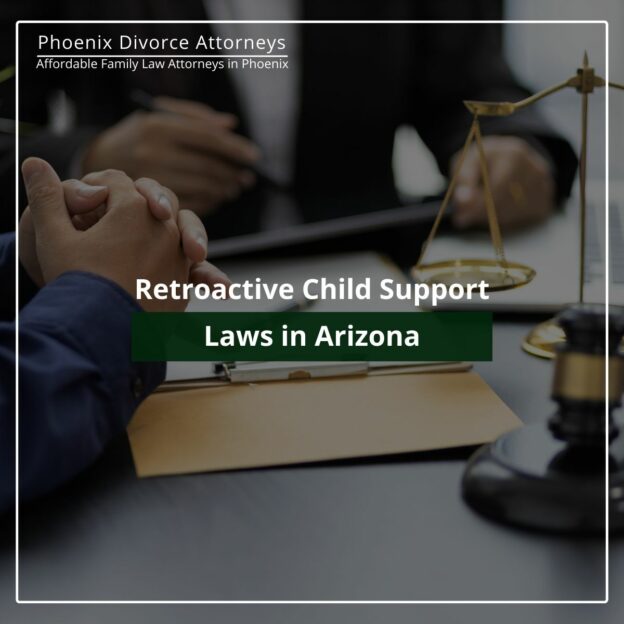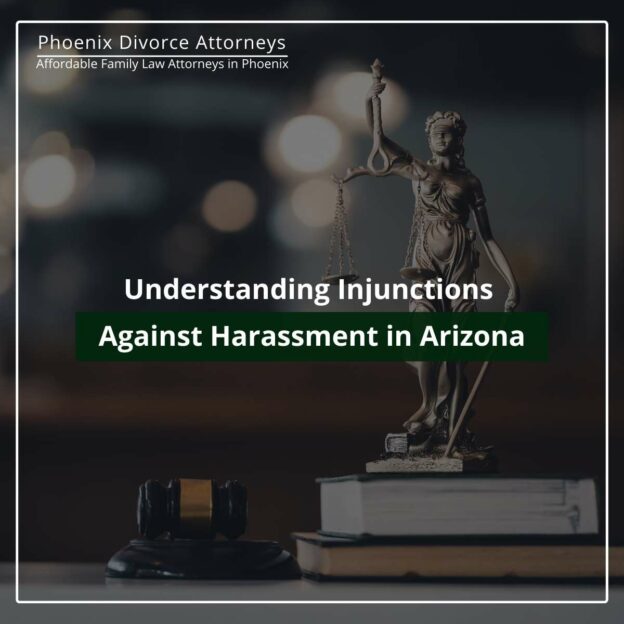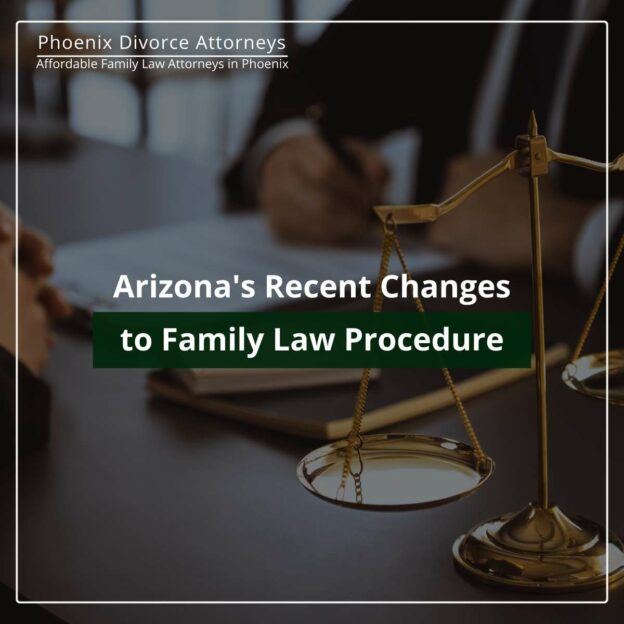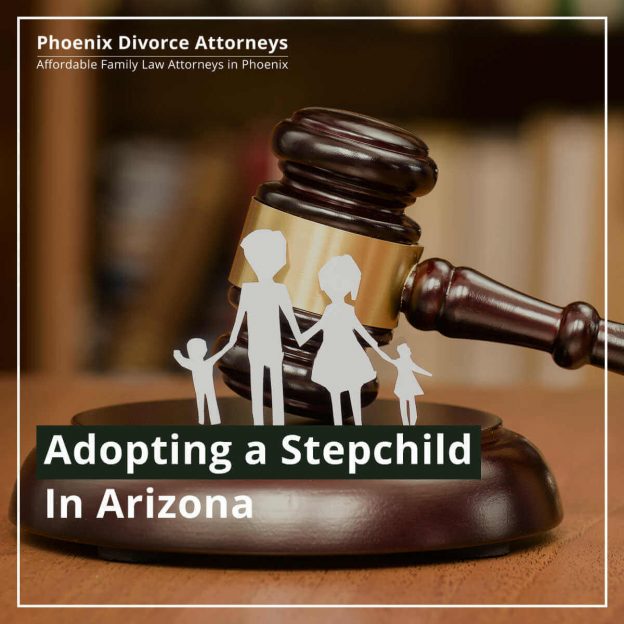By Arizona Family Law Attorney Alison Briggs
Child support plays a crucial role in ensuring the well-being of children in divorced or separated families. In Arizona, like in many other states, child support laws are designed to provide financial support for the child’s needs. One aspect of child support that often raises questions is retroactive child support. In this comprehensive blog, we will delve into the laws in Arizona regarding retroactive child support payments. We will discuss what retroactive child support is regarding Arizona family law cases, situations when retroactive child support may be ordered, how far back it can be ordered, and the key differences between back child support and retroactive child support.
What is Retroactive Child Support?
Retroactive child support refers to child support payments that are ordered by a court to cover a period before the child support order was officially established. In essence, it addresses the financial support that a parent should have provided for their child before a formal child support order was put in place.
Situations When Retroactive Child Support May Be Ordered
In Arizona, retroactive child support may be ordered in specific situations. It’s important to note that each case is unique, and the decision to award retroactive child support is made by an Arizona Family Law Judge based on the specific circumstances. Here are some situations when retroactive child support may be ordered:
- Delay in Filing for Child Support: If a custodial parent delays filing for child support, and it is later determined that the non-custodial parent should have been providing support during that period, retroactive child support may be considered.
- Paternity Establishment: When paternity is established after a significant period has passed since the child’s birth, the court may order retroactive child support to cover the period from the child’s birth until paternity was established.
- Failure to Comply with Previous Support Agreements: If the non-custodial parent has previously agreed to provide support but failed to do so, the court may order retroactive child support to cover the unpaid support from the date the support should have been provided.
- Change in Custody: In cases where the child custody arrangement changes and the non-custodial parent becomes the custodial parent, the previous custodial parent may be required to pay retroactive child support to cover the period during which they had custody.
How Far Back Can Retroactive Child Support Be Ordered in Arizona?
Arizona Revised Statute 25-320 guides retroactive child support. According to this statute, retroactive child support can typically be ordered for a period of up to three years before the date a petition for child support is filed. However, the court has the discretion to order retroactive support for a longer period if it deems it necessary in the best interests of the child.
It’s essential to consult with an experienced family law attorney in Arizona to understand the specific factors that may influence the court’s decision regarding the duration of retroactive child support.
The Difference Between Back Child Support and Retroactive Child Support in Arizona
Now, let’s clarify the difference between back child support and retroactive child support in Arizona:
- Back Child Support: Back child support, also known as arrears, refers to the unpaid child support that has accrued after a child support order has been established. It represents the ongoing financial obligations that a non-custodial parent has failed to meet.
- Retroactive Child Support: Retroactive child support, as discussed earlier, covers the period before a formal child support order was established. It addresses the financial support that should have been provided by the non-custodial parent during that pre-order period.
In summary, back child support deals with unpaid support after a court order is in place, while retroactive child support addresses the support that should have been paid before the court order existed.
Contact an Experienced Arizona Family Attorney for Assistance
Understanding the laws regarding retroactive child support in Arizona is essential for both custodial and non-custodial parents. It’s crucial to be aware of the situations when retroactive child support may be ordered and the duration for which it can be ordered, as outlined in Arizona Revised Statute 25-320. Additionally, distinguishing between back child support and retroactive child support is essential for a clear understanding of your child support obligations or rights in Arizona. If you find yourself dealing with child support issues in Arizona, consulting with a qualified family law attorney is advisable to navigate the legal complexities effectively and ensure the best interests of the child are protected.
Consequences of Not Paying Child Support in Arizona
Failing to pay child support in Arizona can have serious consequences, both legally and financially. Here are some of the potential repercussions for non-payment of child support:
- Legal Action: The custodial parent has the right to take legal action against the non-custodial parent for non-payment. This can result in court proceedings, where the non-custodial parent may be required to provide a valid reason for non-payment.
- Wage Garnishment: Arizona law allows for the garnishment of the non-custodial parent’s wages to ensure child support payments are made. This means that a portion of the non-custodial parent’s income may be automatically deducted and sent to the custodial parent.
- Driver’s License Suspension: If child support payments are significantly overdue, the Arizona Department of Economic Security (DES) has the authority to suspend the non-custodial parent’s driver’s license. This measure is taken to encourage compliance with child support orders.
- Property Liens: The court may place liens on the non-custodial parent’s property or assets, such as real estate, to secure the payment of past-due child support.
- Interest Accrual: Unpaid child support may accrue interest, increasing the overall amount owed. This can result in a substantial financial burden for the non-custodial parent.
- Contempt of Court: If a court order for child support is in place, failing to comply with it can lead to a finding of contempt of court. Contempt of court may result in fines, penalties, or even imprisonment in extreme cases.
- Credit Damage: Non-payment of child support can negatively impact the non-custodial parent’s credit score, making it difficult to obtain loans, credit cards, or housing.
How to File for Back Child Support in Arizona
Filing for back child support in Arizona typically involves the following steps:
- Consult an Attorney: It’s advisable to consult with an experienced family law attorney who can guide you through the process and assess the viability of your claim.
- Gather Documentation: Collect all relevant documentation, including court orders, records of missed payments, and any other evidence that supports your claim for back child support.
- File a Motion: Your attorney will help you file a motion with the court requesting back child support. This motion should outline the reasons for seeking back child support and provide evidence of the unpaid amounts.
- Serve the Other Parent: Proper legal procedures require serving notice of the motion to the other parent, allowing them to respond.
- Court Hearing: The court will schedule a hearing to review your case. Both parties will have the chance to present their arguments and evidence.
- Court Decision: Based on the evidence presented and the applicable laws, the court will decide on back child support. If granted, the court will determine the amount owed and the payment schedule.
Recommendation: Hire an Experienced AZ Child Support Attorney
Navigating child support matters in Arizona, especially when seeking back child support, can be complex and emotionally challenging. Phoenix Divorce Attorneys is a reputable law firm with experienced family law attorneys who can provide valuable assistance in your child support case. Their expertise in Arizona family law ensures that you receive knowledgeable guidance and representation throughout the legal process.
In conclusion, complying with child support obligations in Arizona is crucial to avoid legal consequences. If you are owed back child support or require legal assistance with child support matters, it is highly recommended to seek the help of an experienced Arizona family law attorney to protect your rights and ensure the best interests of your child are upheld within the bounds of Arizona law.
My AZ Lawyers
Office: (480) 833-8000
Phoenix Family Law Office
668 N. 44th St., Ste 320
Phoenix, AZ 85008
Scottsdale Family Law Office
7135 E. Camelback Rd, Ste 230
Scottsdale, AZ 85251
Avondale Family Law Office
12725 W. Indian School Rd, Ste E-101
Avondale, AZ 85392
Mesa Family Law Office
1731 W. Baseline Rd., Ste 100
Mesa, AZ 85202
Glendale Family Law Office
20325 N. 51st Ave., Ste 134
Glendale, AZ 85308













